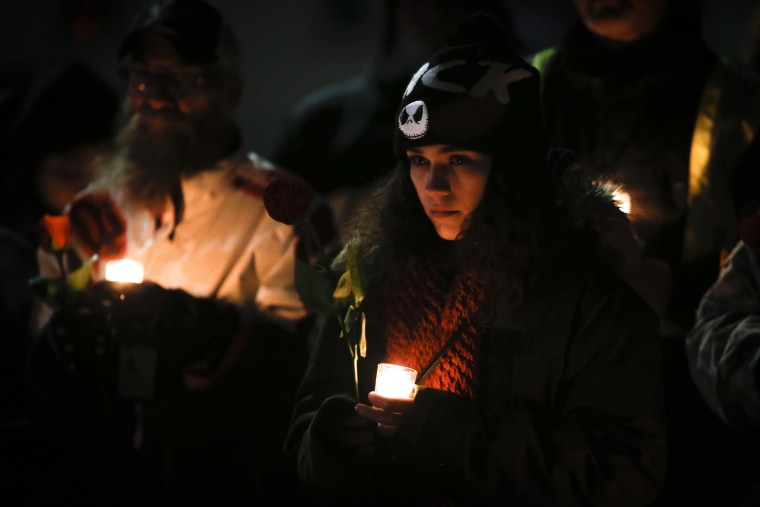Police in Canada are facing scrutiny after they said they believe they know where the bodies of two Indigenous women alleged to have been slain by a suspected serial killer are buried — but that they won't be searching the area because of difficult conditions.
Morgan Beatrice Harris, 39, and Marcedes Myran, 26, are two of at least four Indigenous women who police in Winnipeg, Manitoba, say were murdered by suspected serial killer Jeremy Anthony Michael Skibicki, 35. Skibicki has been charged with four counts of first-degree murder in the women's deaths.
In May, Winnipeg police announced that partial remains of one of the victims, Rebecca Contois, 24, had been found in a landfill.
Police later announced that they had established that Skibicki killed three other victims, including Harris and Myran, both of Winnipeg and members of Long Plain First Nation, from March to May. The fourth woman Skibicki is alleged to have killed has not been identified but is being called Mashkode Bizhiki’ikwe, or Buffalo Woman.
Police Chief Danny Smyth said news conference Tuesday that police believed Harris' and Myran's remains were at a different landfill — the Prairie Green landfill north of the city — but he said police would not be search the site because of potential hazards and ground conditions.
Cam MacKid, a police forensics unit inspector, said the disposal truck believed to have been carrying the remains did not have GPS to help investigators pinpoint which part of the landfill to search. He also said that since the time the remains would likely have been left in the Prairie Green landfill, thousands of loads of debris had been dumped at the site, in addition to 1,500 tons of animal remains.
He said that garbage at the site was later compacted with about 9,000 tons of heavy construction clay and that said a search could be dangerous because of potentially poisonous gases released by waste at the landfill and the presence of asbestos.
While he said the search at the landfill where Contois' remains were found also presented challenges, police had been able to identify the general area where her remains might be thanks to GPS data and video.
At a news conference Tuesday, Harris' daughters, Kera and Cambria Harris, questioned the decision not to search the landfill, Canadian public broadcaster CBC News reported.
They said police told them Monday that their mother’s remains were believed to be at the Prairie Green landfill — and they said officers gave them a PowerPoint presentation explaining why they would not launch a search, the broadcaster reported.
“They say that they can’t search because it’s not feasible. Is human life not feasible?” Cambria Harris said at a news conference in Ottawa aired online by CBC News.
“Time and time again, our Indigenous women and brothers and sisters have to come here, and we have to shout, and we have to raise our voices begging for change and begging for justice for our people, and that is wrong," she said.
‘How can you even fathom the idea to leave them there?’
Kera Harris said she believed police should request federal assistance with the search, rather than choose not to investigate the site.
"I do not agree with how this is being handled," she said. “How can you even fathom the idea to leave them there? These women are deserving of a proper resting place, not to be left alone in a landfill in the dead of winter.
“If you can’t find them, then why haven’t you asked for help? Why can’t you ask for help nationwide rather than just having a small amount of people conduct the searches?” Harris said.
Loved ones of the victims are not the only ones calling for further action.
Niki Ashton, a member of Parliament with the New Democratic Party, tweeted Tuesday: "We remember the Indigenous women who have been targeted and killed because they are Indigenous women. Morgan Harris, Marcedes Myran, Rebecca Contois, and Buffalo Woman killed by a serial killer in Winnipeg this year.
"We stand with their loved ones calling for action now," Ashton wrote.
Amnesty International Canada issued a statement signed by a number of groups, saying the victims' "tragic deaths by an alleged serial killer is yet another source of massive grief for Indigenous communities across Canada, whose long-called for end to colonial violence, classism, racism and misogyny is still not met with an adequate government or broader community response."
"These deaths must not be ignored, nor the reality that they represent the ongoing generational harms and trauma that are rooted in violence against Indigenous women, girls, and Two Spirit people," the statement said.
MacKid, the forensics investigator, said at Tuesday’s police news conference: “It’s tough when we’re being criticized for almost a lack of, a lack of caring, when I don’t think that’s the case. Our members are working extremely hard on this case."
Smyth, the police chief, said: “We acknowledge that the families are heartbroken. We acknowledge that they’re angry, frankly. We acknowledge that a lot of people are angry.
"We’re doing our best to bring justice to the families, and that’s what we hope to do," he said.
Federal Crown-Indigenous Relations Minister Marc Miller said Tuesday that he believed all levels of government have failed Indigenous women, girls and Two Spirit people for centuries, CBC News reported.
“I think as we recognize the failure of the federal government to keep these women safe, it’s important to realize that there are women today that are in the same vulnerable place that these women were, and that continues,” he said.
He was scheduled to meet with Morgan Harris’ family Tuesday, as well as with the chief of Long Plain First Nation, to discuss what support the federal government could provide.

